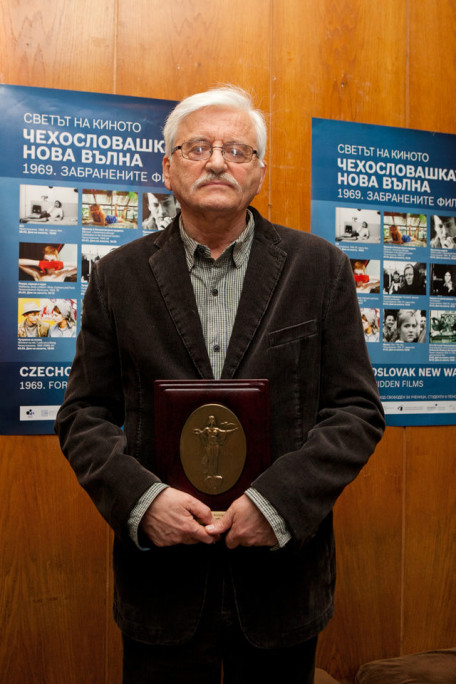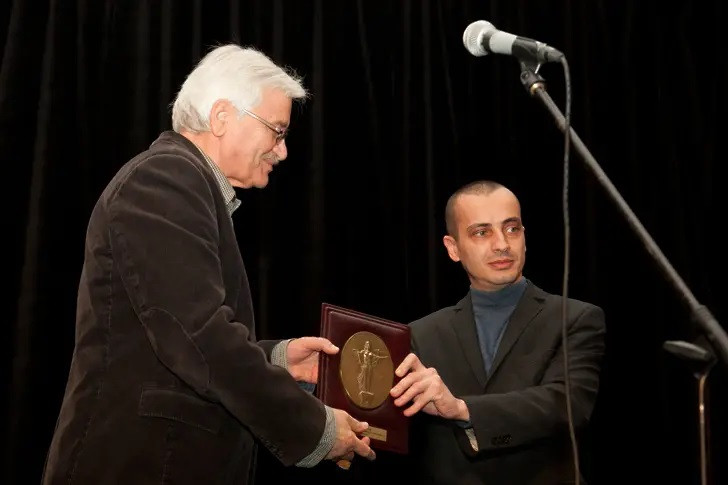“Being a film director is a very risky profession. I have always strived for maximal results. Until not long ago, if one wanted to make a good film in this part of the world, it was necessary for the cinematographers to invest extreme energy and efforts, in order to circumvent the oppressing system. This of course, meant creating many problems for oneself, which worsen the person’s health,” says Dušan Hanák about his hardships during his artistic career. “My generation grew up thinking that making films is an inseparable part of culture, and not only entertainment and profit generating projects, Today’s directors have the obligation to also develop the spiritual, moral and artistic values in people not only nationwide, but worldwide.”
Dušan Hanák was born on April 27, 1938 in Bratislava. In 1965, he graduated the Academy of Performing Arts in Prague (FAMU). He films a series of short films ("Artists", "Learning", "An Appeal Made Into Silence" - 1965; "Old Shatterhand Came to See Us" - 1966, "The Mass" - 1967, "A Day of Joy"- 1972), which win major national and international awards in Oberhausen, Montevideo, international competitions of young art ...
In 1969, Hanak makes his first feature film - "322”, which had been banned in Slovakia immediately after its shooting. The film was secretly presented at the festival for young filmmakers in Mannheim-Heidelberg, where it received the grand prize. Sofia Film Festival's audience had the chance to see the film and to meet the author in person. This cinema production is a deeply psychological and existential drama not only the individual’s health complications, but it is also about society in general. Joseph Lauko a middle-aged chef is suffering from terminal cancer. He lives with his capricious ex-wife. As the ill man agonizes over his condition and waits for death to come, Lauko begins to rethink his life, wondering if he had lived to the full, and whether he had been in real relationships with the people around him. One day he receives a call from the hospital where they are offering him an open bed. Lauko realizes that his end is near, but he is becoming somehow becoming more clearly aware of what the other people’s lives are like.
After his film "322" Dušan Hanák directs the feature documentary "Pictures of the Old World" (1972), which includes philosophical reflections on what lies beneath the idea of "a real life" – the theme of Hanak’s debut film. Cleverly bypassing the postulates of the communist regime, which had tightened its grip in the late 60s, the director uses themes in the film of a common, universally human level of reasoning. Regardless of the estimates, the film is quickly locked away in the forbidden films storages after a short life of the screen. Yet the attitude of the authorities towards his next film "Rosy Dreams" (1976) also attracted positive reviews and "I Love, You Love" (1980), a film for which Hanak receives a "Silver Bear" for best director at the 39-th Berlin International Film Festival.
"I have always been interested in the thin line - that little space which stands between reality and fiction. I do not believe in scenarios that do not correspond to reality. There is a mysterious connection between the themes of my films and true human impulses and values. For me it is important to think about them, to put them in a new context. It's not news representation of reality, but rather a new picture of life itself."
Since 1992 Dušan Hanák has been a lecturer at the Academy of Performing Arts in Prague, and in 1998 the director receives the highest academic title "Professor". In Denver in 1991, during a retrospective covering his films, Dušan Hanák is awarded for his excellence in cinema arts. In 2004 his is bestowed the highest state honours the Pribina's Cross of 1-st Class, for his outstanding contribution to the cultural development of the Slovak Republic. He was also awarded with a "Crystal Globe" prize for his artistic contribution to world cinema at the Karlovy Vary ‘08.
The famous director Dušan Hanák received the Sofia Municipality Award for his Outstanding Contribution to the art of Cinema in 2014.




